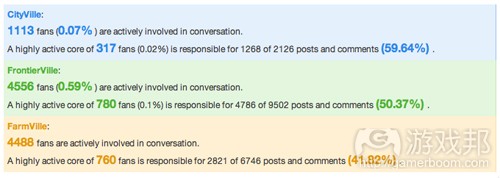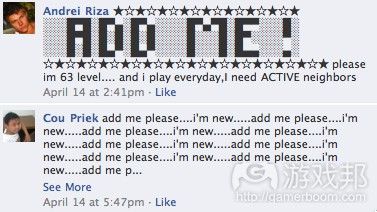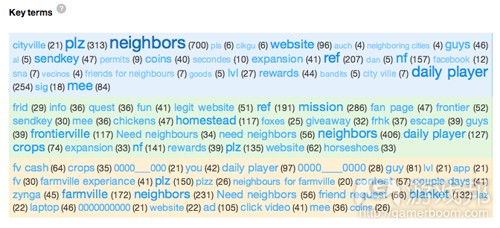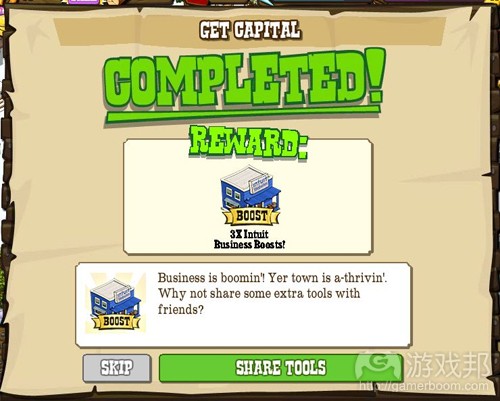从品牌营销活动看Zynga游戏未来走向
作者:Stephanie Shaw
社交游戏在最近几年呈现出爆炸式的发展趋势,据称每月都有2.5亿用户体验社交游戏,Zynga及其麾下的《CityVille》和《FarmVille》等热门游戏更是称雄Facebook。据Parks Associates预测,社交游戏将在2015年实现50亿美元收益,比2010年增加5倍。
Zynga成功的秘诀看似明了:他们充分利用Facebook平台的社交优势,设计人们可短时间即时体验且令人上瘾的游戏。但却鲜有人知晓Zynga之外的企业品牌将如何巧用社交游戏的人气让自己盈利。
我们最近仔细观察了玩家与Zynga游戏之间的互动行为,发现这些社交游戏已经成为企业品牌角逐的战场——成为Facebook平台之上的“国中之国”,并且拥有自成体系的游戏规则,暗藏着Zynga摆脱Facebook并且自立门户的可能。
用户对社交游戏的参与度
研究Facebook应用的最佳利器当然还是应用工具,我们用自己的Skyttle Facebook Analytics这款分析应用来比较《CityVille》、《FrontierVille》和《FarmVille》的用户表现。
很显然,这三款游戏都有庞大的忠实用户群体,但如果深究实际的用户粘性,就会发现游戏本身的用户参与度最高,而游戏粉丝页面的用户粘性却并不理想。
从过去两周三款游戏的“长尾用户分布图”中可以看出,所谓的粉丝页面活跃用户只是一种美好的幻想。这里的“长尾”意指许多用户极少进行互动,在此活跃互动的用户廖廖无几。
这个图表显示《FrontierVille》拥有最多积极发贴的用户,其次是《FarmVille》,最后才是《CityVille》。但如果再看活跃粉丝比例,《CityVille》则以317个积极发贴和评论的粉丝数量(游戏邦注:约占60%)居于首位。
这个数据看起来不赖,但317名活跃粉丝与《CityVille》的1400万用户基数明显不成比例,这说明许多用户都在玩这款游戏,但仅有一小撮人在粉丝页面讨论与该游戏有关的话题。从铁杆玩家之间的对话就可以看出这种迹象。
从上图可见,用户都极度渴望找到更多可帮助完成游戏任务的新邻居。
这种现象可以反映用户粘性吗?基本上没有人与Zynga进行沟通,整个玩家社区几乎都在围绕同一个话题进行讨论。从关键词中可以发现,他们讨论的核心话题包括“邻居”、“每日玩家”、“跪求邻居”、“好友请求”等。
那么这些对话对Zynga游戏有何意义?它们究竟有何价值?
这一点其实正是Zynga的高明之处——他们使用游戏内的用户参与度促使企业品牌在游戏中展开市场营销活动,这会给Zynga和企业带来大量收益。
游戏内置广告
有一些品牌会通过Zynga游戏购买广告,《FarmVille》等游戏就已经与Bing、麦当劳和电影《超级大坏蛋》展开了一系列成功的品牌营销活动。
Bing在《FarmVille》中仅开展24小时营销活动,向玩家提供游戏虚拟货币Farm Cash奖励,并顺利在一天时间中收获了40万新粉丝。
麦当劳的推广活动支持玩家在为期一天的时间中访问麦当劳农场,种植芥茉和蕃茄,然后赢取麦当劳贴牌产品以支援他们自己的农场。
《FrontierVille》中的一项“任务”甚至可以持续数周,也就为品牌创造了获得持续曝光率的机会。例如Intuit Websites最近就在该游戏中推出为期两周的任务,用企业提供的奖励刺激玩家参与该任务以加速游戏进程,他们鼓励玩家在任务过程中与品牌进行有效互动。
《FrontierVille》宣布Intuit任务收到332条用户评论,其中多数属于典型的社交游戏评论——许多玩家都在发出寻找邻居的求助消息(游戏邦注:该消息与游戏任务本身无关),甚至不时抱怨游戏中出现的故障。很显然用户确实有一定的参与度,更重要的是,他们确实加入了游戏任务。
从以上案例可以看出,社交游戏营销活动中的用户参与度与其他推广策略的情况不太一样,但这种游戏内置广告的确更有助于提高品牌曝光率。假如玩家需要用数天时间才能完成《FrontierVille》的任务,那么Intuit Websites在这几天时间中都能获得曝光率。这种营销活动不需要玩家访问《FrontierVille》粉丝页面,只需让他们游戏中参加任务就可以有效展示品牌形象。
关于Zynga独立于Facebook的设想
Zynga游戏因其强大的交互性而备受用户和企业品牌的欢迎,那么大获成功的Zynga在未来数年与Facebook结束合作关系后,下一步行动是什么?
《西雅图时报》曾与Zynga创始人马克·平卡斯进行对话,讨论了假如步入后Facebook时代,Zynga游戏将何去何从的话题。
问:您和Neil曾表示Zynga正创建一个新型服务基础,这是在为Zynga在后Facebook时代的运营作准备吗?
答:在我们关注的多个重点中,人才储备对我们来说非常重要。还有一个就是网络产品——用户在我们所有游戏中所见到的产品,例如Zynga信息中心,有一半以上的玩家每天都会使用这种服务与好友进行互动。我们将为所有Zynga游戏创造更多社交功能。
虽然平卡斯没有正面回答问题,但他明确指出他们正拓展Facebook之外的服务范围,而这些服务很可能与其将来盈利增长有关。
问:你们与Facebook的合作关系是在2014年还是2015年结束?
答:我们甚至从来没想过这个问题。我认为马克·扎克伯格和我自己都希望双方的合作关系可以持续数十年。
虽然Facebook与Zynga是否仍保持密友关系尚不明朗,但社交游戏的未来走向却十分清晰。这对Zynga、社交游戏玩家和企业品牌来说都是个好消息,后者不但可获得成百上千万用户关注,甚至还可能从这些用户相关数据中获益。社交游戏的市场营销潜力不容忽视,其他企业品牌也可以效仿Intuit Websites、Bing和麦当劳的做法,在传递品牌信息的同时增强玩家的在线体验。
当然,这种操作也存在一种风险,那就是《FarmVille》和《CityVille》最终也可能变成与现实生活一样,成为广告牌和广告内容到处泛滥的世界。您认为社交游戏可以摆脱这种宿命吗?
游戏邦注:原文发稿于2011年4月21日,所涉数据及事件以当时为准。(本文为游戏邦/gamerboom.com编译,如需转载请联系:游戏邦)
Farmville and Cityville: More than Fun and Games
Stephanie Shaw
Social gaming has seen explosive growth in recent years, with 250 million people playing social games every month. Zynga leads the pack with its hugely successful Cityville and Farmville games on Facebook. These games alone are forecast to pull in revenues of $5 billion by 2015, five times what they were valued at in 2010 by Parks Associates.
The secret to Zynga’s success may seem clear: they create addictive games that people can play with their friends in an environment (Facebook) that they’re used to at times that are convenient for them (the games are designed to be played in short bursts). What’s less obvious is how brands beyond Zynga can take advantage of the popularity of social gaming.
We recently took a closer look at how social game players interact with Zynga’s games. What we found was an environment that creates an interesting playing field for brands – a world within a world where the rules are different, and a world which could drive Zynga out of the realm of Facebook and into a whole new world of its own.
How Users Engage with Social Games
What better way to study Facebook apps than with an app itself? We put our own Skyttle Facebook Analytics app to the test to compare CityVille, FrontierVille and FarmVille users.
Unsurprisingly, these apps have a hugely loyal user base – each game has millions of fans. However, when you look at actual user engagement, most users engage within the game itself, but not within the games’ fan pages.
Take a look at the “long tail user distribution” over the last two weeks for Cityville, Frontierville, and Farmville – this is a fancy way of looking at the most active users on each fan page. The long tail means that lots of people interact very little, with only a few users interacting a lot:
The long tail graph suggests that Frontierville has more users who are active posters, followed by Farmville then Cityville. But if we take a glance at the numbers, we see Cityville is taking the lead, with 317 fans (nearly 60%) responsible for all posts and comments. It is after all, Zynga’s newest hit:
The numbers aren’t bad, but when compared to the number of likes the actual apps have, these figures seem surprising low – 317 active fans is barely a fraction of the CityVille’s 14 million plus fan base. This suggests that loads of people are playing the actual games, but very few in comparison are talking about it on their fan sites. The conversation from core fans suggests why.
Looking at the quotes, one major theme is clear: people are frantically looking for new neighbors to meet mission requirements and proceed further in the games.
Does this count as user engagement? Nobody is really talking to Zynga; the community is talking to each other and mainly surrounding only this one topic. This is reflected in the top key terms as well, which includes phrases like “neighbors”, “daily player”, “need neighbors”, “friend request”:
So what does this conversation mean for Zynga games? Where is the value?
This is where Zynga has been clever – they’ve used within-game engagement to allow businesses to promote themselves through the games themselves. The result has meant big money for Zynga, and the brands.
In-Game Advertising
Several brands have purchased advertising through Zynga games. Farmville has been around the longest and has seen successful advertisements from the likes of Bing, McDonalds, and Megamind (the movie).
Bing was able to get 400,000 new fans in a day with their advertisement through Farmville. The campaign only lasted 24 hours, but in that short time it was able to harness Farmville’s popularity to offer something people want (Farm Cash) while enhancing Bing’s own social strategy.
McDonalds saw similar success with its Farmville campaign, where users had the opportunity to visit a McDonalds branded farm for only a day. They could plant mustard seed and tomato crops and be rewarded with McDonalds branded products to aid their own farm.
Frontierville has also had its share of in-game advertising. Here, “missions” can last for weeks at a time, offering brands a longer-term opportunity to attract attention. For example, Intuit Websites recently ran its own two-week mission, incentivising users to play by offering business boosts to progress users’ frontiers more quickly. Through the game, participants were incentivised to interact with the brand for the duration of the mission.
Frontierville’s announcement of the Intuit missions received 332 comments, most of which were typical of social gaming comments: a lot of people looking for neighbors (unrelated to the mission) and sometimes complaining of game problems. The users are obviously engaging to some extent but more importantly, they are definitely taking part in the mission.
So it seems that in the case of social gaming, while we don’t see user engagement like we might see with other promotional strategies, in-game advertising such as this does great things for brand exposure. If a Frontierville mission takes a few days to complete, that’s days of exposure for Intuit Websites. It’s not about getting on the Frontierville fan page and talking about it. Just playing the game as the user normally does will do wonders for Intuit’s branding.
Zynga Beyond Facebook
Zynga games are interesting because they’ve create a whole new form of interpersonal interaction, a world within a world. And as long as its fun, anyone can play – this goes for brands too. The success points towards an interesting future for Zynga, whose partnership with Facebook expires in a few years. What next?
Brier Dudley of the Seattle Times did a Q&A with Zynga’s founder and broached the topic of what Zynga will do post-Facebook begging the question if the leader in social gaming will last when social media users move on from Facebook.
Q: The opening comments by you and Neil suggest Zynga is building a new foundation of services. Is that for running Zynga post-Facebook?
A: There are a couple of focuses where this talent pool will be really key for us. One is broadly in network products – consumer facing products that have value across all of our games – like Zynga message center, which is used by more than half of our players every day as a way to interact and be social with their friends. There’s a whole layer that we’re excited about, surfacing more social opportunities in any Zynga game.
While this question isn’t answered directly, he makes it clear that they are expanding their service range outside of Facebook – something that might be critical to future revenue growth.
Q: Your Facebook partnership expires in what, 2014 or 2015?
A: Gosh, we don’t even think about that. I think the way that Mark [Zuckerberg] and I think about that is both of us hope that that is a partnership that lasts decades.
Whether Facebook and Zynga remain bosom friends for the long haul is unclear. On the other hand, the future of social gaming seems crystal. This spells good news for Zynga, social gamers, and brands who want a slice of the fun – and the attention of those millions of social game players. Not only that, but Zynga’s user base offers a fountain of data for brands to take advantage of. The marketing potential is apparent. And as Intuit Websites, Bing, and McDonalds, illustrate, the key is to enhance the gamer’s online experience while getting the brand message across.
Of course, the risk is that Farmville and Cityville will go the way of the real world and become littered with billboards and adverts. Can social games, these worlds within worlds, avoid this seemingly inevitable fate? What do you think? Do you play social games? How do you feel about brands getting in on the action? Your thoughts are welcome in the comments.(source:futurelab)













































 闽公网安备35020302001549号
闽公网安备35020302001549号